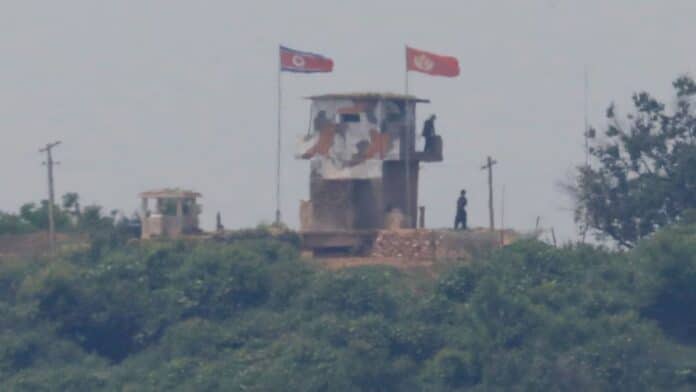North Korea’s Threat to Destroy Cross-Border Roads
With tensions between North and South Korea escalating, North Korea has threatened to demolish cross-border roads. The South Korean military reported that North Korean troops were camouflaged along these routes, indicating possible preparations for destruction, potentially as soon as Monday. This aggressive move follows a series of threats from North Korea aimed at cutting off transportation links with the South, which have historically served as vital connections during times of diplomacy.
Accusations of Drone Activity Over Pyongyang
Koreas are trading accusations as North Korea claims that South Korea has sent drones over Pyongyang to disperse anti-North leaflets. These allegations were deemed serious provocations by the North, with officials warning of dire consequences if such drone activities continue. The South’s Joint Chiefs of Staff have refrained from confirming the drone flights, viewing the North’s claims as an attempt to create justifications for further hostility.
Another layer to this complicated situation is North Korea’s assertion that the drones detected were sophisticated and not something civilians could launch. This raises concerns about the type of drone technology being deployed, suggesting it requires special equipment or launch systems. Analysts note that while civilian drones can cover distances like those from South Korea to Pyongyang, the nature of the drones North Korea claims to have seen implies militarization, creating further tension and uncertainty in cross-border relations.
South Korean Military’s Position on Drone Allegations
Any inquiries regarding the allegations of drone flights over Pyongyang have been met with silence from South Korea’s military officials. They believe addressing these claims could play into North Korea’s strategy of fabricating reasons for further provocations. By avoiding engagement in this dialogue, South Korea aims to maintain a controlled stance amidst an escalating war of words with the North.
Strengthening Anti-Drone Defenses
Now more than ever, you should be aware of South Korea’s proactive measures to enhance its anti-drone capabilities after notable incursions in 2022, when North Korean drones effectively traversed the airspace for several hours. These improvements reflect a significant shift in military strategy aimed at countering the evolving drone threat from the North.
From recent developments, South Korea has taken substantial steps to fortify its defenses, including the upgrade of radar systems and the integration of advanced technologies to detect and neutralize drone threats. The nation’s military experts emphasize that drones capable of carrying light payloads, like leaflets, can easily traverse long distances, making it imperative to enhance surveillance and defensive measures. This increased focus on anti-drone capabilities underscores the importance of security in the volatile relationship between the two Koreas.
The Ongoing Conflict and Armistice Status
With the Korean War officially ending in an armistice rather than a peace treaty, you should understand that North and South Korea remain technically at war. This unresolved status has led to ongoing tensions, with recent accusations and military escalations, including North Korea’s preparations to destroy cross-border roads. The militarized border, known as the Demilitarized Zone, is a constant site of conflict, as both nations bolster their defenses in response to perceived threats.
Past Efforts at Peace and Military Agreements
Some notable initiatives aimed at promoting peace between North and South Korea occurred during periods of diplomatic rapprochement. One significant moment was the 2018 summit, where leaders from both sides declared a commitment to ending hostilities and opening a new era of peace. However, these agreements have since lost their validity, as North Korea has resumed significant military activities near the border.
Status updates on military agreements demonstrate the fragile nature of peace efforts in the region. After the 2018 summit, both Koreas established a military agreement intended to ease tensions; however, North Korea has since reintroduced heavy weaponry and restored guard posts in the Demilitarized Zone. This rollback exemplifies the challenges in maintaining any lasting peace and highlights the ongoing volatility of the Korean Peninsula, underscoring the importance of these historical initiatives.
Potential Consequences of Increased Militarization
You should be aware that the escalating militarization between North and South Korea could lead to significant destabilization in the region. The possible destruction of cross-border roads could further isolate North Korea and increase tensions, potentially sparking military confrontations. With North Korea’s artillery units on standby and the reintroduction of heavy weapons into the Demilitarized Zone, the risk of miscalculation or accidental conflict grows, impacting not only the Koreas but also regional security dynamics.
Diplomatic Efforts Moving Forward
Clearly, navigating the current tensions necessitates renewed diplomatic initiatives between North and South Korea. Both nations must prioritize dialogue to de-escalate hostilities and explore avenues for cooperation. The past agreements, such as the 2018 summit that aimed to prevent war, remind us of the potential for peace if both sides commit to meaningful discussions.
Future diplomatic efforts will need to involve various stakeholders to build trust and foster a conducive environment for peace talks. As both Koreas are still technically at war since the 1950-53 conflict ended in an armistice, any proactive engagement could stabilize the situation. Renewing discussions about military agreements and addressing provocations, like the recent drone incidents, will be important in avoiding further escalation and ensuring long-term peace in the region.


